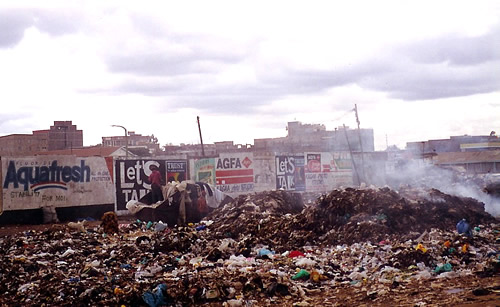Introduction
to Comparative Politics
|

"Looking for food," Nairobi, Kenya, 1999
© A. James McAdams
Ressentiment of the Rest
I could have called this section "the developing world" or "the Third World," but these are quite misleading terms because they bundle together an array of states as diverse as Rwanda and Argentina, Iraq and South Africa, Singapore and China. Instead, I have chosen to focus on what I think Roger Scruton means by "the rest." This is a category of mostly traditional states whose peoples feel uncomfortably left out from developments in much of the world. They may be economically disadvantaged, or they may simply feel marginalized from the political and strategic decisions of the dominant powers. Frequently, social groups within these states are driven by powerful feelings of Ressentiment toward the outside world. This sociological concept refers not only to the English word "resentment," but also to accompanying feelings of helplessness, bitterness, and anger at their unequal position.
27. Monday, November 1"The Reason behind Traditional Society"
Reading: (CR) Eickelman, “Bin Laden, the Arab ‘Street’”As I will explain, a traditional society is organized according to different principles than a modern society. This doesn't mean that one of the two forms of social organization is necessarily better than the other. For analytical purposes, they are just different. Of course, no society is completely modern or completely traditional. However, the mix that different societies have of the two values is directly relevant to their populations' conceptions of politics.
28. Wednesday, November 3
"The Bitter, Brutal, Lasting Legacy of Colonialism"
Reading: (CR) M. Walker, “Making of Modern Iraq”One common denominator of many developing states is their experience with European colonialism. Colonialism didn't necessarily transform these societies, but it defintely exercized a major influence upon their respective political and social values. Whatever one thinks of the merits of colonialism, the experience is still being played out in countries as diverse as Iraq, China, Cuba, and Algeria.
Film III: “Bend it like Beckham”
Wednesday or Thursday, November 3 and 4, 7:00 p.m. each night, location: TBA
Wednesday, November 5: SECOND ESSAY DUE (Hand in your essay to your TA)
29. Friday, November 5.
Discussion #10: Why do we (sometimes) wish we lived in a traditional so society? And what does Notre Dame have to do with the answer?
30. Monday, November 8
"The Sensible Logic of Primordial Peasant Society"
Readings:
(CR) George Foster, "Peasant society and the image of
the limited good"
(J) Child of the Dark, first halfThere are more peasants in the world than any other social group. Although peasant societies are motivated by different cognitions and values than modern societies, their ways of looking at the world represent rational responses to the challenges they face.
31. Wednesday, November 10
"The Grinding Despair of Endemic Poverty"
Readings:
(CR) Linden, "The Exploding Cities"
(J) Child of the Dark, second halfRead:
Most people in the world are poor. No student should graduate from Notre Dame without thinking about the problem of poverty in the developing world and the perspectives of the poor.
32. Friday, November 12
Discussion #11: The Poverty of the Powerless
33. Monday, November 15
"Protectors and Prophets: The General and the Dictator"
(CR) excerpt from R. Rosenberg, Children of Cain
(CR) A. Baram, “Broken Promises”
WebCT / McAdams / Notre Dame
Course Plan / Modern Nation-State/ Liberalism / Leninist Alternatives / / Global Mythologies